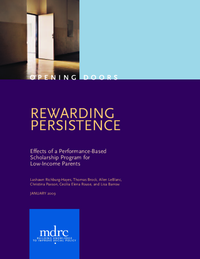Rewarding Persistence
Effects of a Performance-Based Scholarship Program for Low-Income Parents
An investment in postsecondary education has been repeatedly shown to pay high monetary and nonmonetary dividends to students and society at large. Despite such benefits, research shows that close to half of all students who matriculate at a community college drop out before graduating and do not complete a degree at any other college or university within a six-year time frame. The reasons for this are many, ranging from weak academic preparation to difficulties balancing work, family, and school obligations.
To study the effect of supplemental financial aid with an incentive component to encourage academic success and persistence, two New Orleans-area colleges operated a performance-based scholarship program with counseling in 2004-2005. The program was targeted to low-income parents as part of MDRC’s multisite Opening Doors demonstration. With funding from the Louisiana Department of Social Services and the Louisiana Workforce Commission, the colleges offered students $1,000 for each of two semesters ($2,000 total) — distributed in three separate payments each semester — if they met two conditions: They had to enroll in college at least half time and they had to maintain an average grade of “C” or better. Students did not have to be welfare recipients, and the scholarships were paid in addition to federal Pell Grants. Program counselors monitored whether students met benchmarks, and physically handed the students their checks at the beginning, middle, and end of the semester.
Using a random assignment design — the “gold standard” methodology in program evaluation — MDRC assigned 1,019 parents who were enrolled or planning to enroll in a community college to either a control group that received their college’s standard financial aid package and student services or to a program group that received the same standard aid package and student services in addition to being eligible for the Opening Doors performance-based scholarship. Analyses in this report show that:
- The Opening Doors program encouraged more students to register for college. Students who received the scholarship were not only more likely (by 5.3 percentage points) to register, they were more likely (by 6.4 percentage points) to register full time, although only half-time enrollment was required to maintain the scholarship.
- The program increased persistence. Longer-term analyses for the first groups of students who entered the Opening Doors study show that program group students were more likely, by 6.5 percentage points, to be registered through four semesters after random assignment.
- The program increased the number of credits students earned. Follow-up data on the first groups of students to enter the Opening Doors study show positive effects on credit accumulation and grades through the fourth semester after random assignment.
- The program had positive impacts on a range of social and psychological outcomes. Students in the Opening Doors program reported greater engagement in working toward their personal goals and higher levels of perceived social support.
Tragically, Hurricane Katrina, a category five hurricane, hit the Gulf Coast in August 2005, interrupting the follow-up period of the study. However, MDRC has made it a priority to replicate the program (and variations of it) in order to build more evidence on the potential of performance-based scholarships to help at-risk students through its recently launched Performance-Based Scholarship demonstration.







